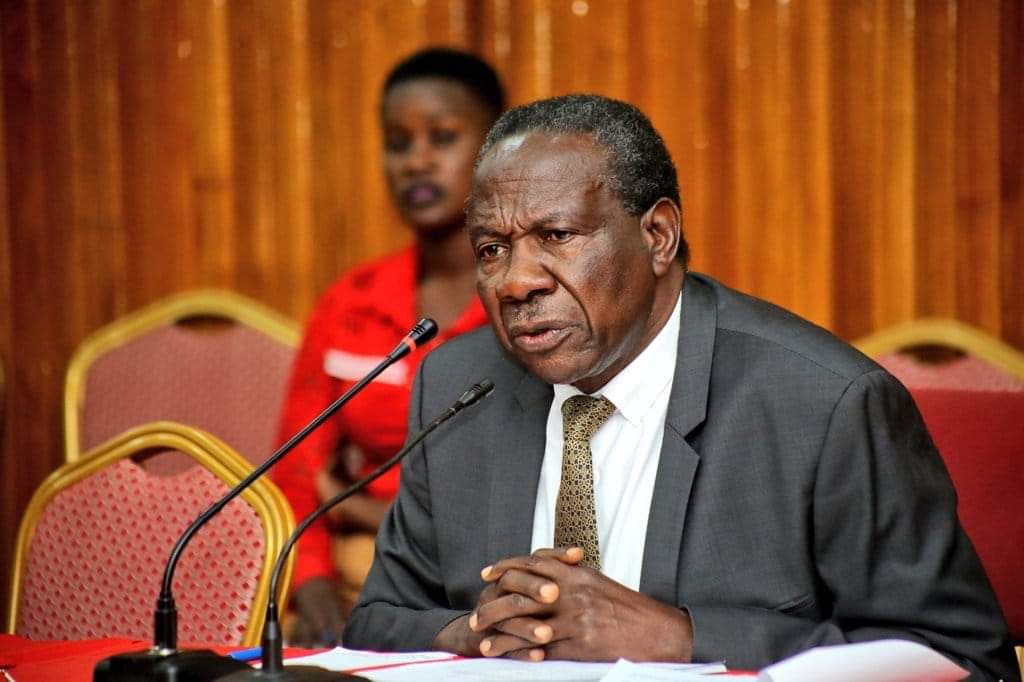Prime
Govt borrows locally to save some of these banks, says Ggoobi

(Left-Right) Mr Ggoobi, Absa managing director Mumba Kalifungwa, Mr Omolo, and Mr Kaboyo chat during the dialogue in Kampala last Friday. Photo / Justus Lyatuu
What you need to know:
- Mr Ramathan Ggoobi says banks are sitting on a mountain of money of which government only borrows the excess
Government says it will continue to borrow domestically to keep some local banks in operation.
Secretary to the Treasury Ramathan Ggoobi, said last Friday that government will borrow Shs9 trillion domestically to finance the 2024/25 budget, noting that before borrowing, a lot of considerations are taken, among them spurring business growth.
“These banks have about Shs27 trillion. They are sitting on a mountain of money. I don’t know why they don’t lend to the public at 12 percent. If we don’t enter that market, most of them would be in trouble, our financial sector too. So, we borrow from a balanced point of view. We are mindful of the crowd-out effect. We only take the excess,” he said.
Mr Ggoobi was speaking during the 2024 NTV-Absa post-budget dialogue in Kampala last week. In the 2023/24 financial year, government more than doubled domestic borrowing to Shs6.8 trillion, amid a decline in donor inflows, pushing the stock of domestic debt to Shs38.1 trillion as of December 2023.
However, this is expected to increase by at least Shs2.2 trillion, with government indicating that it will borrow Shs9 trillion domestically in the 2024/25 financial year.
Banks continue to exercise caution in regards to private sector lending due to an increase in default rates, preferring to lend to government directly or through treasury bills and bonds.
Mr Michael Segwaya, the Absa executive director, said banks look at government as their best customer due to guaranteed repayment, noting: “We ask ourselves [if we lend to the] private sector, what is the probability of paying back and how much are you likely to lose as you give out this money.”
The dialogue, organised by NTV and supported by Absa and Deloitte under the theme: Implications of the 2024/25 budget on the private sector, sought to discuss opportunities and impact of new taxes on businesses and the larger economy. Participants had earlier cautioned against domestic borrowing, warning that government risked boxing the private sector out of the credit market.
Mr Johnson Omolo, the NTV general manager, said that whereas government has funding gaps, it should decrease the appetite for borrowing, especially from the domestic market.
“My private observation is that government should decrease domestic borrowing [because] the private sector will be boxed out of the market,” he said, noting that government should also offer a clear signal on how to stimulate the private sector through paying domestic arrears.
Domestic arrears due to government stand at about Shs7 trillion, but government only commits about Shs200b on payments annually, some of which have not been paid in over five years.
Mr Stephen Kaboyo, the Alpha Capital managing partner, said government needs to check its debt appetite, noting that a large chunk of taxes now goes to debt servicing.
“Many countries that had the same fundamentals have found themselves in a debt trap; Zambia, Ghana, Ethiopia. We should have a game plan. We should not pretend that the economy ... can absorb the debt. We need to be mindful. We have already breached [some] debt indicator,” he said.
Mr Jim Drani Drileba, the Deloitte manager risk advisory, cautioned government against wasteful expenditure, amid increased targets for revenue collection, noting that “URA is doing a good job, but the money is wasted through supplementary budgets”.




